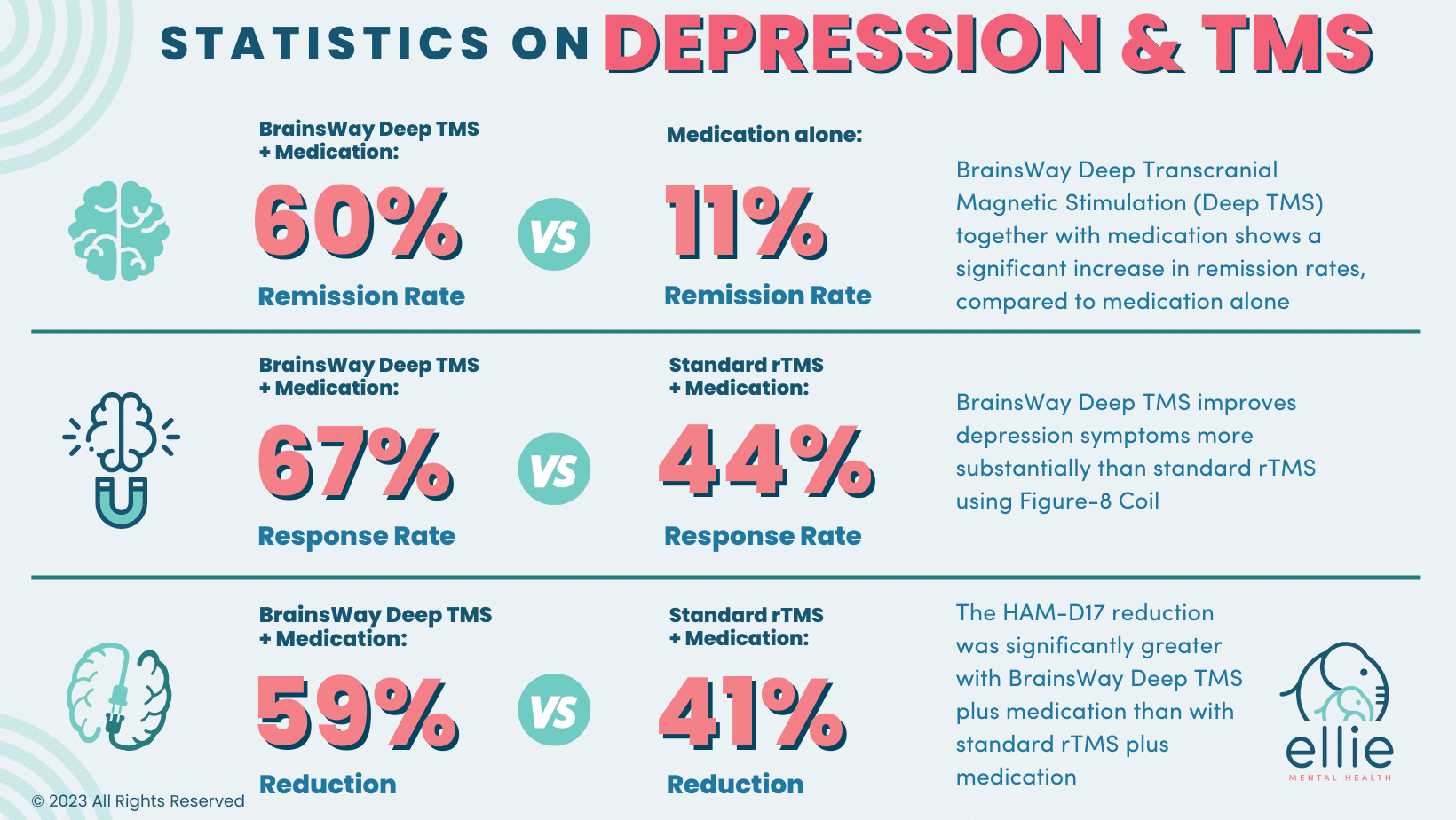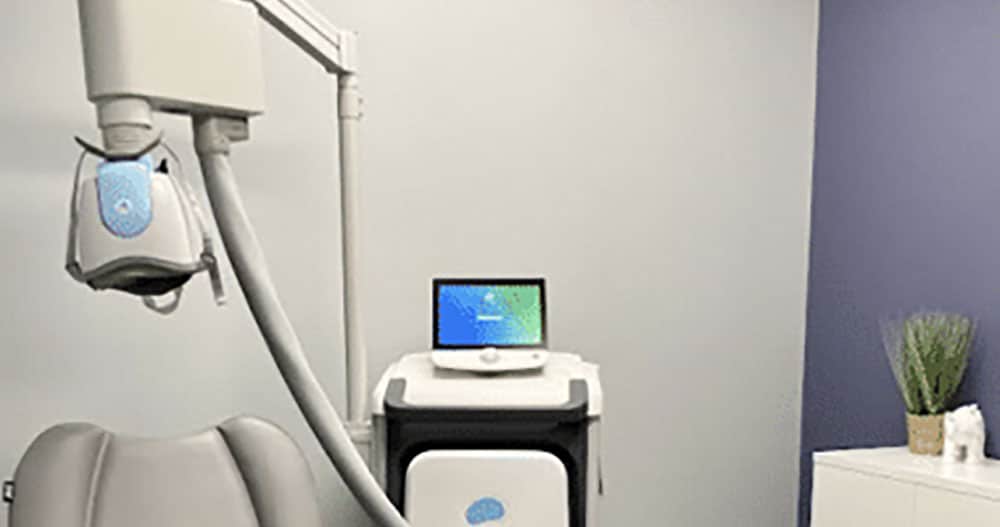Have you been down, sad, or depressed and feel like you’ve tried everything? Feel like you hit a wall? Tried what seems like every therapy and medication under the sun? You bought the white noise machine, spent too much on self-help books, changed your diet, your sleep schedule, and sat in front of a lamp called “Happy.” It’s been months—maybe even years—and nothing has worked. The cloud is still there lurking over you, antagonizing you at every turn.
The first thing to remember is: Don’t give up. You have options. You are not alone. According to the Anxiety & Depression Association of America, nearly 16 million Americans over age 18 struggle with depression annually. In fact, depression is the leading cause of disability in young adults in the United States.
While conventional therapy offers a range of potential solutions to combat depression, an option for dealing with depression that refuses to go away is Transcranial Magnetic Stimulation (TMS).
Has therapy not been useful in treating your depression? Reach out to Ellie Mental Health today to learn more about how TMS can help.
What is Transcranial Magnetic Stimulation?
Now, before you find yourself going down a rabbit hole, TMS is not “shock therapy.” While Electroconvulsive Therapy (ECT) may be another—often effective—option down the road. ECT is a procedure that is done under anesthesia where brief electrical pulses are delivered to the brain to induce a seizure. While this is an effective treatment, it carries the risks of general anesthesia and can produce memory loss.
TMS is a non-invasive, FDA-approved, outpatient treatment. Studies have shown that TMS+ medication is successful in achieving total remission of depressive symptoms in 60% of people and can cut symptoms in half in 67% of people with treatment-resistant depression. That means that even if you have tried common therapies that include group, individual, behavioral, cognitive, psychodynamic, and medications including antidepressants such as SSRIs or SNRIs, TMS is still likely to help you get back on track.
TMS is an effective, evidence-based, brain stimulation method that utilizes pulsating magnetic fields to stimulate the frontal lobe of the brain to improve symptoms of depression. You are fully awake, there is no seizure activity and no memory loss. With TMS, mild side effects such as headaches and fatigue may manifest, but these are usually minimal and subside quickly.
What Qualifies You for TMS?
Therapy is different for everyone. TMS may be an option for you if your depression has continued to persist after you’ve been diagnosed with a major depressive disorder, tried mental health medications, and have had a full course of therapy. You also may want to consider TMS if you have been dealing with side effects from the medication you have been taking to treat your symptoms of depression.
There are a few criteria you must meet to sign up for TMS:
- Be 18 years of age or older
- Have a previous diagnosis of a major depressive disorder, recurrent, and severe without the presence of psychosis
- Have had a trial of four antidepressant medications from two different classes of medication needs to be completed with no improvement indicated or intolerable side effects (this can vary between insurance companies)
- Complete a sufficient trial of evidence-based psychotherapy
Conditions and issues that will prevent you from receiving TMS include:
- Patients with non-removable metal in the head or neck (not including dental fillings)
- Patients with a history of seizures or are diagnosed with a current seizure disorder such as epilepsy
- Patients with bipolar disorder
- Patients with active psychosis
- Patients in pregnancy
- Patients with a pacemaker or the presence of a spinal or vagus nerve stimulator
TMS is covered by most medical insurance carriers for the treatment of depression when clinical criteria are met. Ellie’s TMS Coordinator will streamline this process and assist you in determining if TMS is a covered service and if prior authorization is required before starting.
What Happens During a TMS Session?
For TMS treatment you will come to the clinic, sit in a chair, put on a strange-looking helmet, and feel a light tapping on your head for 20 minutes. That tapping you’ll experience is the helmet using pulsating magnetic fields to stimulate nerve cells in the frontal lobe of the brain, an area believed to be important in depression. Many patients describe this feeling as a woodpecker lightly pecking on their head. While you may notice a bit of discomfort at first, this usually subsides, and you’ll likely get accustomed to it over the course of your treatment. You will also have a caring TMS Operator with you the entire time to help you with any questions or anything else you might need.
In a typical setting, your treatment course will last eight weeks, with a predetermined number (typically 36) of weekly sessions usually lasting 20 minutes each. Just keep in mind that your treatment plan may vary slightly depending on what you and your clinician discuss.
What Are the Benefits of TMS?
TMS has become a beacon of hope for many who suffer from debilitating depression. Let’s remind you of the stats:

In addition to achieving full remission, or at least a significant reduction in symptoms of depression, other benefits of TMS include:
- TMS does not prevent you from driving
- TMS is highly effective at treating depression
- TMS is non-invasive
- Short sessions that fit with your daily routine
- Free from systemic or debilitating side-effects
Evidence suggests that patients who are less treatment-resistant may respond better to TMS than those who are highly treatment-resistant. It is also important that you continue taking medications after a course of TMS and continue working with your therapist.
TMS at Ellie Mental Health
Let’s face it, living with depression is complicated enough, and feeling apprehensive or anxious about your treatment options certainly doesn’t help. At Ellie Mental Health, we strive to make your mental health journey as stress-free as possible.
Here at Ellie, all TMS services will be done in-house. You will receive your treatment in a known setting and around familiar faces. This not only provides you with the security and comfort of knowing you are in safe hands, but it allows your providers more efficient, effective communication about your treatment.
Our staff fully understands how scary depression can be. The thought of TMS treatment alone may be enough to give you goosebumps. Our mission is to make you feel as comfortable as possible. And we will work with you to ensure that you have a full understanding of each step we take in your treatment.
Please know that each of our staff members is highly trained in TMS therapy and will offer you a personalized approach to your treatment. This means you can put your mind at ease for each session. We’ve got this. Remember, while depression can isolate you and try to stuff you into a hole of despair, we are in this thing together. You have options. You are not alone.
At Ellie, we administer deep TMS with the FDA-cleared BrainsWay device, which targets an area of the brain important in depression. BrainsWay’s H1 coil is used to treat depression.
Are you ready to get a hold of your depression and unwanted side effects? Contact Ellie today and ask if TMS could be right for you.


